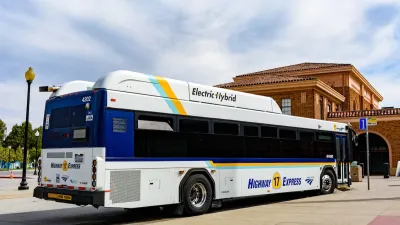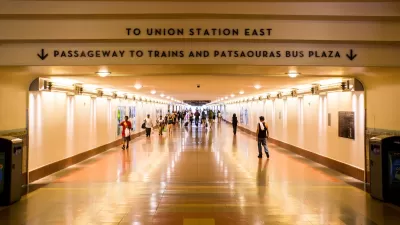As part of a larger series, NY Times guest blogger Eric A Morris talks about traffic in LA, and how the city's structure affects ease of transportation.
"According to the Texas Transportation Institute's 2005 Mobility Report, Angelenos who traveled in the peak periods suffered 72 annual hours of delay. This was number one in the nation, by a large margin.
The T.T.I.'s methodology has some issues, but it is probably safe to say they got this right. I have studied Los Angeles traffic conditions for an 18-year period. My conclusion, to put it in formal transportation terminology, is that Los Angeles traffic really, really sucks.
Not that this eases our pain much, but San Francisco and New York, cities that supposedly show Los Angeles how transportation and urbanization should be done, are tied for second and 15th respectively in most hours of congestion delay."
Thanks to Franny Ritchie
FULL STORY: Traffic in LA: Fact and Fiction

Manufactured Crisis: Losing the Nation’s Largest Source of Unsubsidized Affordable Housing
Manufactured housing communities have long been an affordable housing option for millions of people living in the U.S., but that affordability is disappearing rapidly. How did we get here?

Americans May Be Stuck — But Why?
Americans are moving a lot less than they once did, and that is a problem. While Yoni Applebaum, in his highly-publicized article Stuck, gets the reasons badly wrong, it's still important to ask: why are we moving so much less than before?

Research Shows More Roads = More Driving
A national study shows, once again, that increasing road supply induces additional vehicle travel, particularly over the long run.

Judge Halts Enforcement of Anti-Homeless Laws in Grants Pass
The Oregon city will be barred from enforcing two ordinances that prosecute unhoused residents until it increases capacity and accessibility at designated camping sites.

Advancing Sustainability in Los Angeles County Schools
The Los Angeles County Office of Education’s Green Schools Symposium brings together educators, students, and experts to advance sustainability in schools through innovative design, climate resilience strategies, and collaborative learning.

Using Old Oil and Gas Wells for Green Energy Storage
Penn State researchers have found that repurposing abandoned oil and gas wells for geothermal-assisted compressed-air energy storage can boost efficiency, reduce environmental risks, and support clean energy and job transitions.
Urban Design for Planners 1: Software Tools
This six-course series explores essential urban design concepts using open source software and equips planners with the tools they need to participate fully in the urban design process.
Planning for Universal Design
Learn the tools for implementing Universal Design in planning regulations.
City of Moreno Valley
Institute for Housing and Urban Development Studies (IHS)
City of Grandview
Harvard GSD Executive Education
NYU Wagner Graduate School of Public Service
City of Cambridge, Maryland
Newport County Development Council: Connect Greater Newport





























